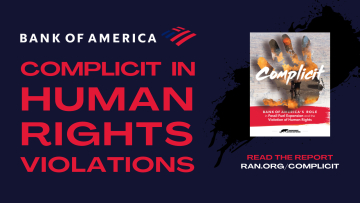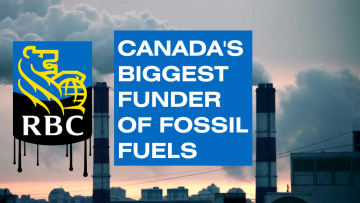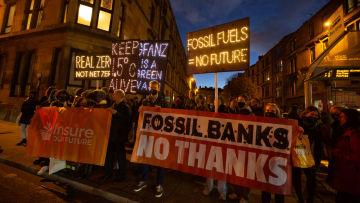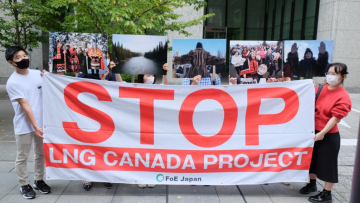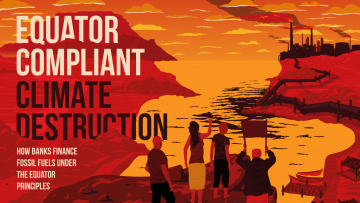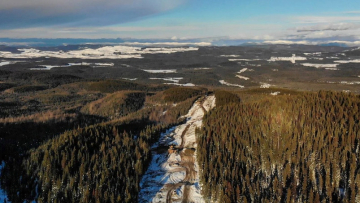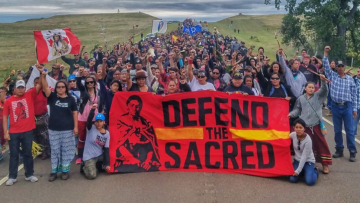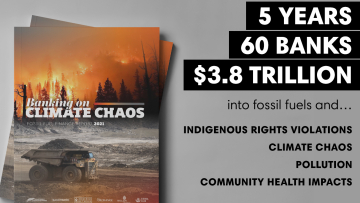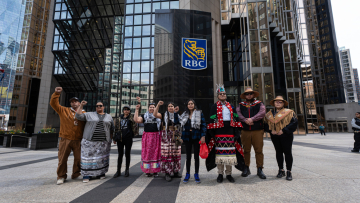
Project – On record
This profile is no longer actively maintained, with the information now possibly out of dateBankTrack

Project – On record
This profile is no longer actively maintained, with the information now possibly out of dateBankTrack
Why this profile?
The Coastal GasLink pipeline that is currently under construction is heavily opposed by the Indigenous Wet'suwet'en Nation, whose land, water and community will be threatened by the pipeline's construction. New pipelines such as these are also incompatible with achieving the goals of the Paris Climate Agreement.
This project is also part of BankTrack's Tracking the Equator Principles campaign.
What must happen
Banks that finance the Coastal GasLink pipeline, either directly or indirectly, are facilitating Indigenous rights violations as well as environmental harm. Banks should refrain from financing the project itself as well as the companies behind it.
| Sectors | Pipeline Transportation of Natural Gas |
| Location |
|
| Status |
Planning
Design
Agreement
Construction
Operation
Closure
Decommission
|
| Website | https://www.coastalgaslink.com/ |
|
|
This project has been identified as an Equator Project |
The Coastal GasLink pipeline is a 670-kilometre pipeline currently under construction in British Columbia, Canada. The pipeline is intended to transport fracked gas from Dawson Creek to Kitimat. From there, LNG Canada will convert the gas into liquefied natural gas (LNG) for export to global markets. The project costs are estimated to be CAD 6.6 billion. The pipeline is expected to start operating in 2023 with an initial capacity of two to three billion cubic feet of gas per day. The pipeline has the capacity to expand to five billion cubic feet of gas per day.
Impact on human rights and communities
Indigenous rights The Coastal GasLink pipeline currently under construction will run through the lands of the Wet'suwet'en nation. In violation of the United Nations Declaration on the Rights of Indigenous Peoples, Coastal GasLink did not receive free, prior and informed consent for the construction of the pipeline from the lands' title holders.
In the 1997 case Delgamuukw v. British Columbia, Canadian courts recognised that the hereditary chiefs are the title holders over the Wet'suwet'en nation's traditional lands, and thus have the authority and jurisdiction to make decisions about the lands. However, in order to get consent, the federal and national governments ignored the hereditary chiefs. Instead they went to the band councils who, according to the Delgamuukw case, do not have authority off-reserve.
For years already, the hereditary chiefs of the Wet'suwet'en nation are opposed to the Coastal GasLink pipeline and all other pipelines. When Coastal GasLink moved onto their lands, the hereditary chiefs asked them to leave. In response, Coastal GasLink obtained a court injunction to forcefully remove hereditary chiefs, Wet’suwet’en land defenders, and supporters from their own land.
In February 2020, following widespread solidary protests, a Memorandum of Understanding (MoU) was drafted by the Wet'suwet'en, provincial and federal governments. While the MoU recognises the authority of the hereditary chiefs, it does not address or resolve the dispute over the Coastal GasLink pipeline.
Environmental Assessment Certificate In February 2020, the hereditary chiefs of the Wet'suwet'en nation filed an application to the British Columbia (B.C.) Supreme Court, requesting a judicial review of the decision made by the Environmental Assessment Office (provincial agency that assesses major development proposals in British Columbia) to grant an extension to the Environmental Assessment Certificate for the Coastal GasLink pipeline. The chiefs argue that the extension, which was granted in October 2019, should not have been granted based on Coastal GasLink's non-compliance with the conditions of its permits (read more under 'environmental issues') as well as the findings of Canada's National Inquiry on Missing and Murdered Women (read more under 'gender aspects').
Industrial work camps Besides Coastal GasLink's noncompliance with conditions set out in its initial Environmental Assessment Certificate, in its application to B.C. Supreme Court the hereditary chiefs point to the results of an inquiry into the cases of Missing and Murdered Indigenous Women and Girls. The inquiry found that there is ''substantial evidence that natural resource projects [like Coastal GasLink] increase violence against Indigenous women and children and two-spirit individuals'' through the creation of 'man camps'. The inquiry calls for the ''government to do gender-based analysis of the impact of new resource projects''. According to the Wet'suwet'en, Coastal GasLink's 'Social and Economic Effects Management Plan' falls short and does not include such an analysis.
Health issues Physicians in Dawson Creek (where the natural gas that Coastal Gaslink will carry is fracked) recently warned of health issues related to fracking activities after seeing patients with symptoms they could not explain. These symptoms include nosebleeds, respiratory illnesses and rare cancer types which can be attributed to highly toxic chemicals like benzene, toluene, 2 butoxyethanol and heavy metals which seep into drinking water as a result of fracking.
Impact on climate
It is expected that the Coastal GasLink pipeline will transport up to five billion cubic feet of natural gas every day when in operation. When burned, this natural gas is equivalent to the emission of 585.5 million pounds of CO2 every day. This corresponds to approximately 13% of Canada's daily greenhouse gas emissions in 2017. In general, all development of untapped fossil fuel sources is incompatible with the Paris climate agreement. Analysis by Oil Change International shows that the currently developed fossil fuel reserves for gas, oil and coal are already double the remaining carbon budget for a 50% chance of staying below 1.5°C of global warming.
An article published by Canada's National Observer in June 2020 report that the Canadian government is undermining its own climate goals by supporting pipeline projects such as the Coastal GasLink pipeline
Impact on nature and environment
Violations of environmental conditions According to the hereditary chiefs, Coastal GasLink does not comply with the conditions set out in the initial Environmental Assessment Certificate of 2014. In its inspection reports, the Environmental Assessment Office notes dozens of violations by Coastal GasLink in 2018 and 2019. The violations range ''from blocking Indigenous people from accessing their traplines to missing deadlines on commitments to conserve caribou and endangered plants''. In June 2020, the Environmental Assessment Office of British Columbia found that TC Energy had cleared a large stretch of protected wetland areas for construction without proper surveying and planning. These wetlands are of cultural and ecological importance for the Wet'suwet'en and also serve as habitats for various species at risk and many fish species, which have not been taken into account while determining the adverse impact of the Gaslink pipeline. Due to this, more than 42 wetlands have already been affected from the construction procedures and if the construction goes on without the development of site-specific mitigation strategies, more than 300 protected wetlands will be affected.
Pollution The Coastal GasLink pipeline will carry gas fracked from the Montney Shale Formation. Hydraulic fracturing, or fracking, is the technology being used to develop unconventional hydrocarbon reservoires. Scientific research shows that the employment of fracking negatively impacts public health, water, soil and air. The technique makes use of several dangerous chemicals that are released during the process causing pollution.
Diesel spills In June 2020, The Tyee reported that two fuel spills occurred on Wet'suwet'en territory. Both of the spills caused 500 litres of diesel to leak into the ground. One of the spills occurred at the Community-Industry Safety Office of the Royal Canadian Mounted Police (RCMP), which was set up to patrol pipeline protests in the area. The second spill occurred at a work camp for the Coastal GasLink pipeline. Both of these spills were not reported to the hereditary chiefs until days after the fact.
Impact on pandemics
Covid-19 While British Columbia extended its state of emergency, pipeline construction is allowed to continue as it is classified as an essential service by the provincial government. It is reported that even though there are less workers on-site, the workers remain in close proximity. The situation has caused fears of an outbreak. An article published on Ricochet explains how some Indigenous people are reminded of "the darkest episodes of North America’s violent colonial legacy, including the 1837–38 smallpox epidemic caused by infected blankets that white settlers gave to unsuspecting Native Americans.'' Makwala Smith, a protestor against the relevant legislation said: ''If our isolated communities start getting infected by the virus because of the coming and going of police and CGL workers, this would mean the continuation of the cultural genocide brought upon by racist attitudes and decades of colonialist policies that have been imposed on our people.'' In December 2020, a COVID-19 outbreak was reported in two accommodation sites for workers, infecting 27 people, who are said to have transmitted the virus in and between the sites. This further highlights the lack of safeguards that TC Energy has in place to curb the spread of the virus and protect its own workers.
In May 2020, it was reported that TC Energy (the company which previously fully owned and operated the project through its subsidiary TransCanada Pipelines) secured project financing for the Coastal GasLink pipeline. The project finance is estimated to cover up to 80% of the project costs. See below for the banks and financial institutions that provided this debt. Besides project finance, five commercial banks (Royal Bank of Canada, Bank of Montreal, Scotiabank, CIBC and TD Bank) have provided Coastal GasLink with working capital.
The remaining costs will be provided through equity by TC Energy. More information on who finances TC Energy can be found on the company's profile.
Note: Sumitomo Mitsui Trust Holdings is listed as a financier by IJGlobal, but not by Bloomberg.
Initially, the Coastal GasLink pipeline project was fully owned by TransCanada Pipelines, a 100% subsidiary of TC Energy - which is also behind the controversial Keystone XL tar sands pipeline. In May, 2020, TC Energy closed a deal selling 65% of the project to investment firm Kohlberg Kravis Roberts & Co (KKR) and Alberta Investment Management Corporation (AIMCo). Big banks HSBC, TD, and Royal Bank of Canada helped make this ownership sale happen.
KKR is a publicly-traded American global investment firm headquartered in NYC, with USD $429 billion in assets under management as of June 2021. This purchase was made in partnership with South Korea’s state-run pension fund, the National Pension Service of Korea (NPS).
AIMCo manages USD $118 billion in assets on behalf of 32 Alberta pension, endowment, and government funds. It is a Crown corporation, which in this case means that it is owned by the government of Alberta.
Environmental Assessment Act of British Columbia, Canada
Wet'suwet'en Hereditary Chiefs Reject Pipelines
Thousands rally for Wet'suwet'en solidarity
Video links
2022
2022-03-23 00:00:00 | Construction update - Coastal Gaslink
Construction activities steadily progress (overal construction progress is at 52.2%) spring breakup nears - the time of year when field construction work is reduced due to soft, thawing ground conditions caused by melting snow.
Construction of the pipeline is divided into 8 sections. Section 1 is almost complete with 100% of grading completed and 99.4% of pipe installed. Section 2 has 85.9% of grading completed and 28.7% of pipe installed. Section 3 has 62.5% of grading completed and 55.2% of pipe installed. Section 4 has 100% of grading completed and 99.7% of pipe installed. Section 5 has 88.5% of grading completed and 39.6% of pipe installed. Section 6 has 84.7% of grading completed and 36% of pipe installed. In section 7, 96.6% of the project site has been cleared resulting in 11.2% of grading to be completed and 0% of pipe installed. Section 8 has 72.2% of grading completed and 29.8% of pipe installed.
2022-03-09 00:00:00 | Indigenous groups sign option to buy 10% ownership stake in Coastal GasLink pipeline
Two groups representing the interests of more than a dozen First Nation communities along the Coastal GasLink pipeline route have signed option agreements to acquire a 10 per cent ownership stake in the $6.7-billion project in northern British Columbia.
The equity option for Coastal GasLink, which is still under construction, will be exercisable once the pipeline is commercially in service sometime in 2023.
The agreements, announced March 9, would allow First Nations groups to become owners in Costal GasLink alongside the Alberta Investment Management Corporation (AIMCo), private equity giant KKR, and TC Energy Corp.
Chief Corrina Leween of Cheslatta Carrier Nation said she’s hopeful that the resulting revenues will help First Nations invest in infrastructure and community resources like daycares and elder care. “We’ve never had the opportunity before to participate in ownership of a major project that crosses our territory”, she said in an interview.
2022-02-23 00:00:00 | Construction update - Coastal Gaslink
According to Coastal Gaslink, overall project progress surpassed 60 per cent completion. The construction progess is at 50.3% . This year, they will begin to complete pipe installation.
2020
2020-07-07 00:00:00 | Construction comes to a halt due to non-compliance
In June 2020, due to non-compliance with management and survey guidelines, the Environmental Assessment Office ordered TC Energy to cease all construction operations within 30 meters of wetland areas that were designated as socioeconomically important, until a proper survey and planning is undertaken by the company.

